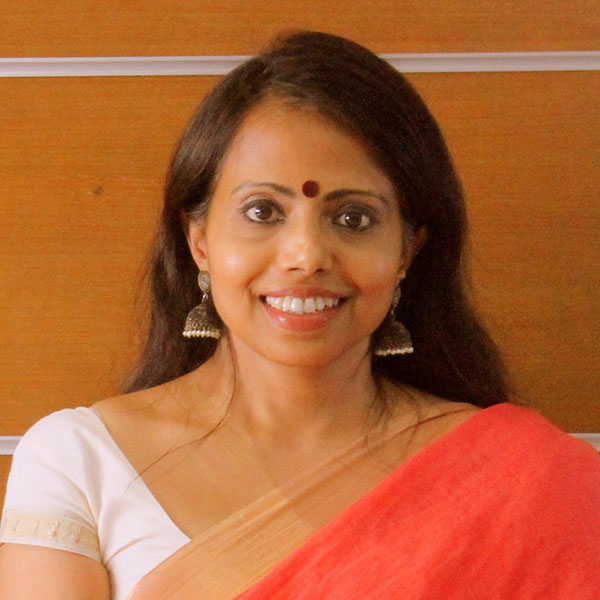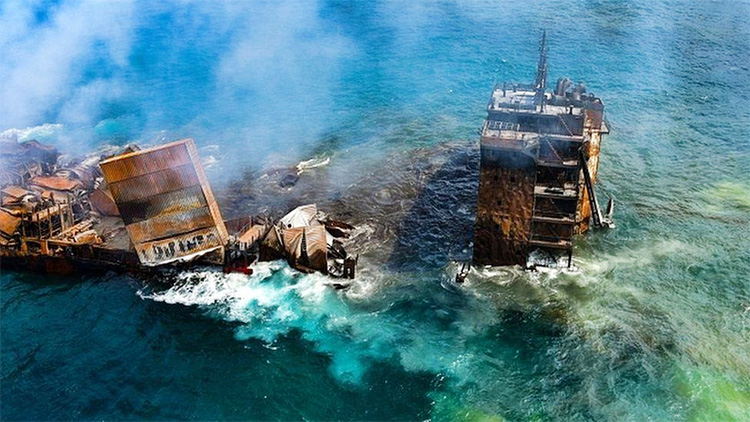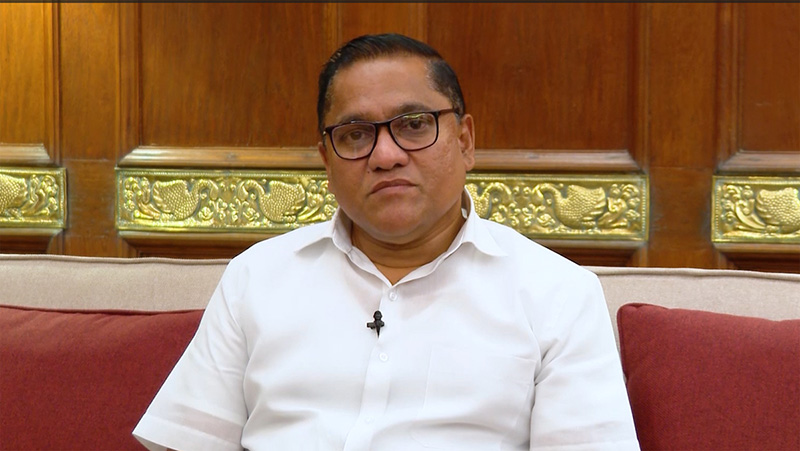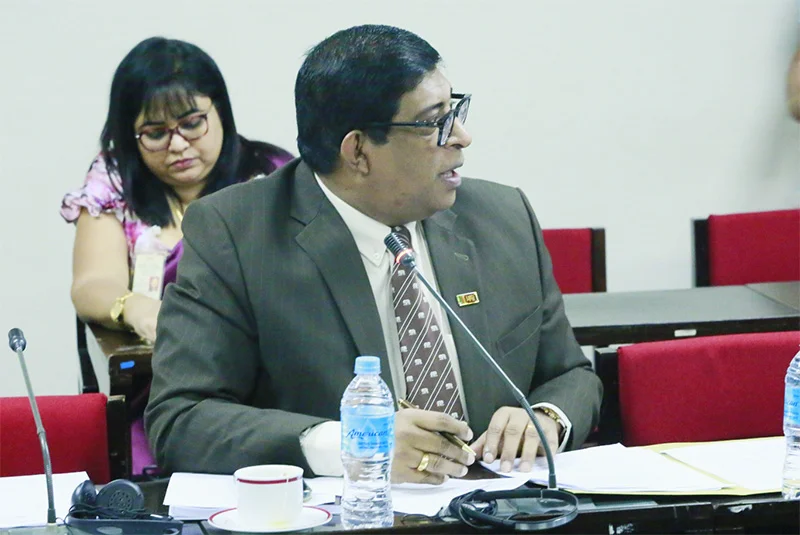News
Geneva controversy: Ambika hits back hard at Foreign Ministry

Human Rights Advocate Ambika Satkunanathan has alleged that the culture of impunity is well documented, not only by civil society organisations, human rights defenders and the UN, but most importantly the Supreme Court and the Human Rights Commission of Sri Lanka. Since 2020 several incidents of violence by state officials have been publicly recorded. Yet, to date, the number of persons held accountable is negligible.
The former member of the Human Rights Commission said so in a statement issued in response to a statement titled ‘Human Rights: FM challenges Neelan Tiruchelvam Trust over its representations to Geneva ‘ in Feb 5, 2022 edition of The Island. The following is the text of her statement issued in response to the Foreign Ministry statement that dealt with Satkunanathan’s representations before the European Parliament Sub-Committee on Human Rights:”The FM
statement contains numerous misrepresentations and insinuations, and appears to be aimed at silencing critique of government policies and actions.
In my statement to the Sub-Committee, I spoke of a number of issues, many of which I have previously written about with supporting evidence. This is available in the public domain. These are issues that other civil society organisations and activists have raised and documented over the years. In this context, the government labelling my statement “misleading”, appears to be an effort to downplay the issues raised and deceive the public.
It is disturbing the government has taken umbrage at my appeal to the European Union (EU) to advocate with the government to fulfil its international human rights obligations using GSP Plus trade privileges as a conduit. The GSP Plus privileges are dependent on the recipient fulfilling human rights obligations. The said human rights obligations are obligations the government has a duty to fulfill as a member of the United Nations and signatory to several UN conventions. These are obligations that provide protections to the citizens of Sri Lanka.
It is regrettable the government refuses to acknowledge that any adverse outcome of the GSP Plus review process would only be due to its failure to fulfill the GSP Plus scheme’s requirements. Hence, it is the government that has to take responsibility for any adverse outcomes. Instead, the government implies that those who advocate for the protection of the marginalised, such as Free Trade Zone workers, are responsible for a possible adverse outcome because they highlight the government’s failures. This is an attempt to deflect blame. To ensure there is no adverse impact on vulnerable communities, the government needs to acknowledge that the crisis is the result of its poor policy decisions, taken without bearing the best interests of citizens in mind.
Efforts to bring lasting peace to Sri Lanka are undermined by denials of the root causes of the armed conflict, i.e. discrimination. Instead, the MFA statement labels discussion of the root causes as LTTE propaganda. This is ominous given the decades long strategy of weaponising the PTA against Tamils. Implying such discussion is a danger to communal harmony, as the Ministry does in its statement, can be used to weaponise the International Covenant on Civil and Political Rights Act to stifle dissent. The government’s use of these phrases will create fear amongst civic activists, especially in the North and East, and shrink civic space further. The very space the government denies is shrinking.
In this regard, the insinuations made in the Ministry’s statement are dangerous. My attention has been drawn to articles peddling false information about my supposed links to the LTTE being circulated on social media in the wake of the statement. The statement therefore could cause persons with racist ideologies to harass and perpetrate violence, including cyber violence against me.
The culture of impunity is well documented, not only by civil society organisations, human rights defenders and the UN, but most importantly the Supreme Court and the Human Rights Commission of Sri Lanka. Since 2020 several incidents of violence by state officials have been publicly recorded. Yet, to date, the number of persons held accountable is negligible.
The “war on drugs” (erroneously referred to as war and drugs in the statement) is being used to justify arbitrary arrests and detention as well suspected extra-judicial killings by police in Sri Lanka. The Bar Association of Sri Lanka too has raised concerns about this. It is important to curb the supply of drugs and international drug trafficking. However, such policies need to adhere to human rights standards.
Although the MFA claims Sri Lanka is a secular country, several statements have been made by the President in which he mentions inter alia, that ‘’protection of Sinhala Buddhists is his foremost responsibility’’ and that “all others who would love to live in unity have to be assimilated into this main socio-cultural basis of this country, based on rich Buddhist values”. This is illustrative of the Sinhala Buddhist nationalism to which I referred in my statement. Another example is the Presidential Task Force on Archeological Heritage Management in the Eastern Province, which has the membership of Buddhist clergy and is headed by a Buddhist monk. The ‘One Country One Law’ Task Force is chaired by Gnanasara Thera, who has publicly made inflammatory and discriminatory statements and incited violence against Muslim community. Such an appointment begs the question whether the government is concerned about the preservation of social harmony.
The Ministry has conflated the process of militarisation, with the military occupation of land. The former includes the military undertaking tasks that were and should be within the purview of civilian entities. The phenomenon of militarization has been meticulously recorded by civil society, including myself, and is publicly available for reference.
Despite the Ministry’s claim the government views civil society as partners and not adversaries, regrettably, its statement singling out my statement to the EU, is the perfect example of the government’s intolerance of dissent. Furthermore, several civil society organisations and activists, particularly from the North and East, have been questioned by the Terrorism Investigation Division (TID) during the last year. That they are being subject to these “routine security checks” when there is no prima facie evidence of wrongdoing, casts doubt on the government’s assertion of partnership with civil society.
As a Sri Lankan citizen, it is my right and civic duty to question the actions of elected representatives of this country when such actions lead to the suffering and marginalisation of vulnerable communities, and demand accountability. Only a country that respects this right can be considered truly independent and democratic.
Finally, the Ministry has referred to my position as Chairperson of the Neelan Tiruchelvam Trust in the statement. However, I did not make the statement to the Sub Committee as Chairperson nor represent the Trust at the hearing. I delivered the statement in my capacity as a human rights advocate, and it in no way has any relationship to the Trust.”
News
X-Press Pearl disaster fuels global call to classify plastic pellets as hazardous

Nearly five years after the catastrophic sinking of the X-Press Pearl, off Sri Lanka’s western coast, the environmental scars remain visible — from contaminated beaches to disrupted fisheries. Now, that tragedy has become a rallying point for an international coalition of scientists, demanding urgent reforms to global maritime law.
A group of leading researchers and environmental experts is calling on the International Maritime Organisation (IMO) to formally recognise plastic pellets — commonly known as nurdles — as hazardous to the marine environment. They argue that existing international shipping regulations fail to adequately address the environmental devastation caused by pellet spills.
Their appeal comes through a newly accepted scientific commentary, published in Cambridge Prisms: Plastics, consolidating decades of research on the impacts of plastic pellet pollution.
Plastic pellets are small, lentil-sized (2–5 mm) particles made from virgin or recycled plastic and used to manufacture a vast range of plastic
products. Scientists say that spills occur frequently during handling and transport, both on land and at sea. Once released into the ocean, pellets persist for decades, spreading across vast distances and entering marine food chains.
Dr. Jennifer Lavers, who studies pollutants in seabirds, warned that the scale of plastic ingestion has reached crisis levels.
“Today the volumes of plastic pellets entering the marine environment are enough to ‘feed’ millions of young seabirds,” she said. “In some areas we are seeing nearly a 100% rate of plastic ingestion, with pellets being particularly problematic.”
Beyond physical harm such as digestive blockages in wildlife, pellets also pose chemical threats. According to Dr. Sinja Rist of DTU Aqua, they are far from inert materials.
“Pellets are persistent, widely dispersed, readily ingested by wildlife, and capable of transporting hazardous chemicals,” she explained, noting that they can absorb and release toxic substances across oceans.
Sri Lanka’s experience with the X-Press Pearl disaster, in 2021, highlighted these dangers on an unprecedented scale. The burning container ship released vast quantities of chemicals and billions of plastic pellets into the sea, causing widespread marine contamination and severe economic losses to coastal communities.
Hemantha Withanage, Chairperson of the Centre for Environmental Justice in Sri Lanka, said the disaster exposed major gaps in international maritime regulation.
“After studying the aftermath of the X-Press Pearl disaster, it is impossible to argue that plastic pellets are harmless cargo,” Withanage stressed. “The impacts in Sri Lanka were immediate, widespread, and long-lasting. Stronger international regulation is essential to prevent this from happening again.”
Under the International Convention for the Prevention of Pollution from Ships (MARPOL), the intentional discharge of plastics is banned. However, scientists argue that current rules are inadequate when it comes to preventing or responding to accidental spills, especially those involving container ships.
The researchers are urging the IMO to assign plastic pellets a specific United Nations classification number. Such recognition would formally acknowledge their environmental hazard potential and trigger stricter requirements for packaging, labelling, and emergency notification during shipping.
Dr. Therese Karlsson, lead author of the commentary and Science Advisor for the IPEN, said the scientific case is clear.
“There are decades of studies highlighting threats from plastic pellets released into the oceans, including risks to marine animals and the food chain,” she said. “Plastics contain thousands of chemicals, many known to cause harm to the environment and human health. It is past time for global regulations to protect our oceans.”
The European Union has recently introduced measures aimed at preventing pellet losses throughout the supply chain, and in 2021 the IMO committed to addressing pellet pollution as part of broader efforts to reduce marine plastic litter. Yet experts warn that without binding global action, pellet spills will continue.
For Sri Lanka, still recovering from one of the worst maritime environmental disasters in its history, the international call carries particular urgency.
Scientists say the message from the island nation’s experience is unmistakable: plastic pellets must no longer be treated as ordinary cargo, but as hazardous materials demanding strict global oversight.
By Ifham Nizam
News
Foreign Minister Herath decries deadlock in global disarmament

Minister of Foreign Affairs, Vijitha Herath, has underscored the urgent global need for enduring peace, security, and strengthened multilateral cooperation, warning that rising geopolitical tensions have created deadlocks in global disarmament efforts and posed serious challenges to international humanitarian law.
The Minister said so while addressing the High-Level Segment of the Conference on Disarmament (CD) in Geneva on Monday (23 Feb), reaffirming Sri Lanka’s firm commitment to global disarmament and multilateral cooperation.
Minister Herath said that safeguarding the future of humanity must be treated as a paramount priority, stressing that trust and mutual respect are essential foundations for effective decision-making in multilateral forums. He reaffirmed that Sri Lanka remains committed to ensuring a secure and stable world for future generations.
Highlighting Sri Lanka’s longstanding role in nuclear disarmament, he recalled the country’s contribution to the 1964 Non-Aligned Movement Summit in Cairo, which called for the establishment of nuclear-free zones. He reiterated that Sri Lanka continues to strongly support such initiatives, particularly in the Middle East, and emphasiSed that total elimination and non-proliferation remain the only guarantees against the use of nuclear weapons.
Sri Lanka also urged that non-nuclear-weapon states must receive unconditional, non-discriminatory, legally binding security assurances, achievable through the work of the Conference on Disarmament.
On humanitarian demining, Minister Herath noted that Sri Lanka remains an active partner in that effort and currently serves as a senior member of the victim assistance committee of the Anti-Personnel Mine Ban Convention. He further reaffirmed Sri Lanka’s continued commitment to the Cluster Munitions Convention, which the country presided over in 2019.
Recognising the rapidly evolving threat landscape, the Minister warned of the impact of emerging technologies that have already reshaped the global disarmament architecture while putting international humanitarian law at significant risk. In this context, he said Sri Lanka has been advocating for the early start of negotiations on a legally binding instrument to prohibit lethal autonomous weapon systems.
He also addressed growing threats to outer space security, stressing that Sri Lanka, long a supporter of disarmament in outer space, continues to back negotiations on a legally binding instrument to prevent an arms race beyond Earth.
Minister Herath concluded by affirming Sri Lanka’s readiness to work with all nations to ensure global efforts toward a safer world are accelerated and achieved at the earliest opportunity.
News
CoPF orders officials to establish legal framework for Rs. 200 for estate workers daily attendance allowance

The Parliamentary Committee on Public Finance has directed officials to establish a proper legal framework for the Rs. 200 daily attendance allowance provided by the Government to estate workers.
During the Committee meeting on February 17, 2026, chaired by MP Dr. Harsha de Silva, members emphasised that while there is no objection to increasing estate worker wages, the current payment mechanism lacks a formal legal basis. The allowance is being distributed under a Memorandum of Understanding (MoU) with private plantation companies without gazette notification, leaving the arrangement vulnerable to termination and excluding contributions to the Employees’ Provident Fund (EPF) and Employees’ Trust Fund (ETF), according to parliament sources.
Officials noted that the MoU with plantation companies was valid for three years, and thereafter a policy decision would be required to continue the payments. The Committee stressed that public funds should not be used to pay salaries in private institutions without proper financial discipline, despite the allowance being approved under the 2026 Budget as a “development subsidy.” The Deputy Secretary to the Treasury suggested the payment would be more appropriately classified as a “production incentive,” though existing payments and MoUs did not specify such requirements.
The Committee also reviewed disaster relief efforts for those affected by Cyclone Ditwah. Officials reported that approximately Rs. 24.4 billion had been disbursed under various relief programs, including allowances for house cleaning, household purchases, and school assistance. Delays in housing reconstruction and rental support were attributed to damage assessments and land identification, with Committee members urging faster delivery of housing aid.
Officials from the National Insurance Trust Fund (NITF) highlighted reinsurance claims of around Rs. 11 billion following Cyclone Ditwah, noting that although NITF had not reinsured its exposure internationally since 2023, it was capable of settling existing claims.
-

 Features3 days ago
Features3 days agoWhy does the state threaten Its people with yet another anti-terror law?
-

 Features3 days ago
Features3 days agoReconciliation, Mood of the Nation and the NPP Government
-

 Features3 days ago
Features3 days agoVictor Melder turns 90: Railwayman and bibliophile extraordinary
-

 Features2 days ago
Features2 days agoLOVEABLE BUT LETHAL: When four-legged stars remind us of a silent killer
-

 Features3 days ago
Features3 days agoVictor, the Friend of the Foreign Press
-

 Latest News5 days ago
Latest News5 days agoNew Zealand meet familiar opponents Pakistan at spin-friendly Premadasa
-

 Latest News4 days ago
Latest News4 days agoTariffs ruling is major blow to Trump’s second-term agenda
-

 Latest News5 days ago
Latest News5 days agoECB push back at Pakistan ‘shadow-ban’ reports ahead of Hundred auction













